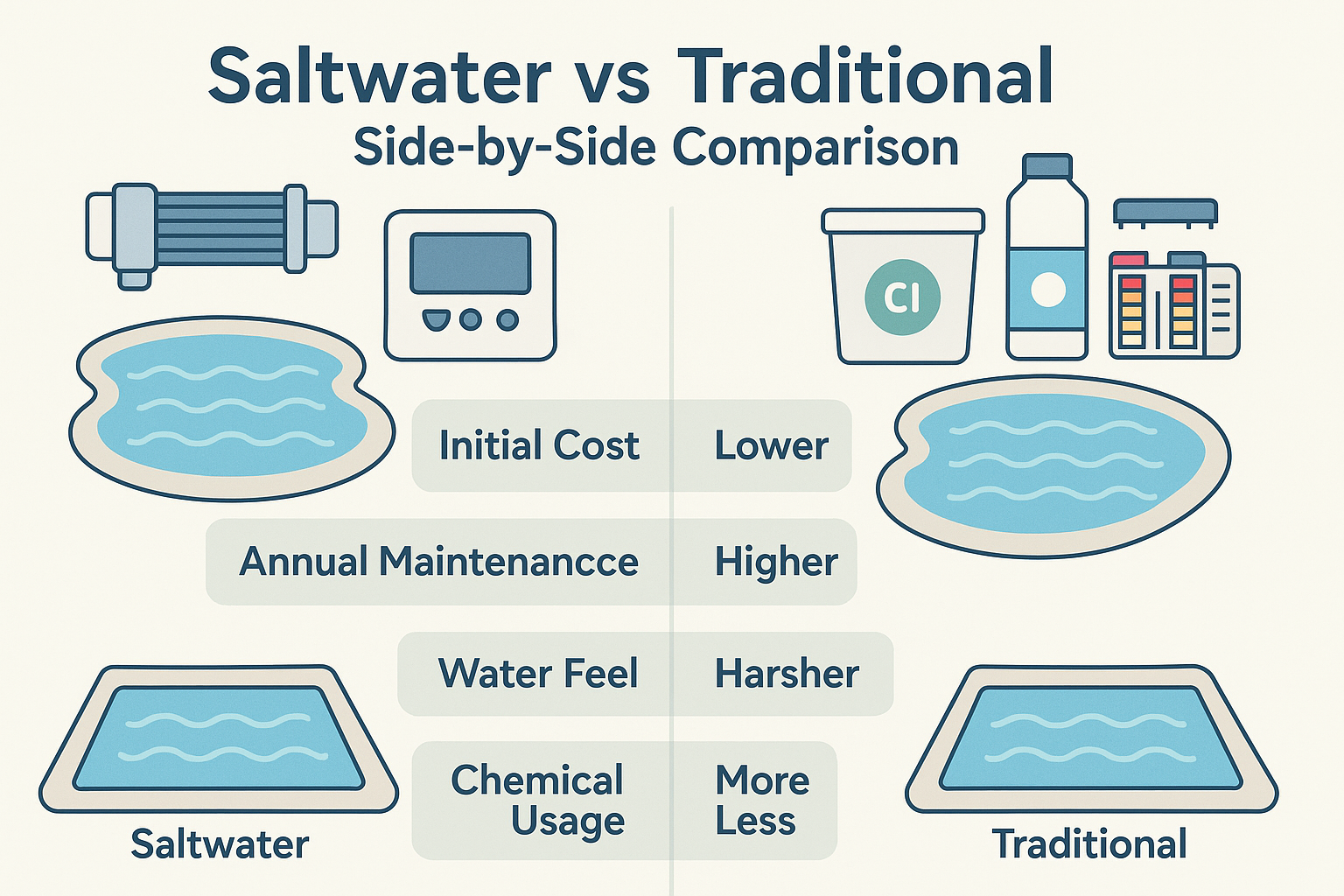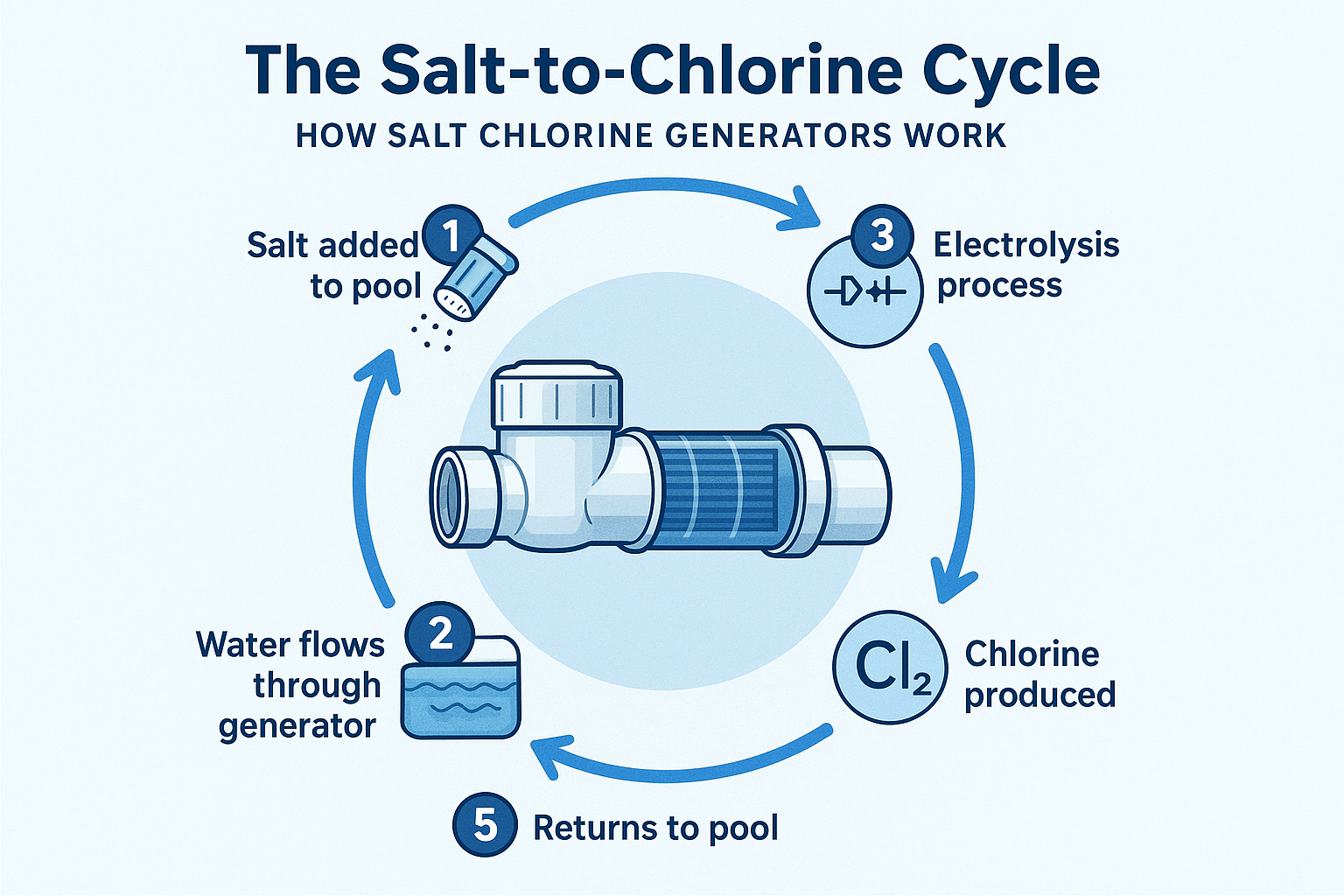

Have you ever dreamed of swimming in crystal-clear water that feels silky smooth on your skin, without the harsh chemical smell of traditional chlorine? Welcome to the world of saltwater pool systems! 🌊 As we dive into 2025, more homeowners are making the switch from traditional chlorine pools to saltwater alternatives, and for good reason. These innovative systems are revolutionizing backyard swimming, offering a more natural, comfortable, and often more economical swimming experience.
I remember the first time I swam in a saltwater pool – it was like discovering swimming all over again. No more red eyes, no more itchy skin, and definitely no more of that overwhelming chlorine smell that clings to your hair for days. If you’re considering making the switch or simply curious about what all the fuss is about, you’ve come to the right place!
Let’s start with a common misconception: saltwater pools aren’t chlorine-free. Instead, they use a clever process called electrolysis to convert salt (sodium chloride) into chlorine. The magic happens in a device called a salt chlorine generator or salt cell, which produces a steady, consistent level of chlorine without the need for manual chemical additions.
The salt concentration in these pools is surprisingly mild – typically around 3,000-3,500 parts per million (ppm). To put that in perspective, ocean water contains about 35,000 ppm of salt. That’s why you won’t taste much salt when swimming, and you definitely won’t float like you’re in the Dead Sea!
The process is beautifully simple:
This continuous cycle means you’re not constantly adding harsh chemicals to your pool. It’s like having a mini chlorine factory right in your backyard! 🏭
One of the biggest advantages I’ve experienced with saltwater pools is how much better they feel. The water is noticeably softer, almost silky. Your skin feels moisturized rather than dried out, and that post-swim shower doesn’t feel quite as urgent. Many people with sensitive skin or conditions like eczema find saltwater pools much more comfortable.
While you’ll still need to monitor and balance your pool chemistry, the day-to-day chemical maintenance is significantly reduced. No more lugging heavy chlorine buckets or dealing with caustic chemicals. The salt cell does most of the work for you! This makes pool maintenance less of a chore and more of a simple routine. For those interested in understanding pool cleaning service costs, switching to saltwater can potentially reduce your monthly service expenses.
Here’s a breakdown of typical costs:
| Cost Category | Traditional Chlorine | Saltwater System |
|---|---|---|
| Initial Setup | $300-500 | $1,500-2,500 |
| Annual Chemicals | $300-800 | $70-100 |
| Cell Replacement (3-7 years) | N/A | $500-800 |
| 5-Year Total | $1,800-4,500 | $1,850-3,100 |
Traditional pools often experience chlorine spikes and dips, leading to algae growth or over-chlorination. Saltwater systems maintain a steady chlorine level, resulting in consistently clean, clear water. This stability means fewer “pool emergencies” and more time enjoying your pool!
Installing a saltwater pool system isn’t as daunting as it might seem. Whether you’re converting an existing pool or starting fresh, the process is straightforward with the right approach.
When planning your installation, it’s worth consulting with reliable pool service professionals who have experience with saltwater conversions.

Don’t let anyone tell you saltwater pools are maintenance-free – they’re not! However, the maintenance is generally easier and less frequent than traditional pools. Here’s what you need to know:
Just like traditional pools, saltwater systems need seasonal attention. Check out this helpful checklist to keep your pool clean this summer for comprehensive seasonal maintenance tips.
Let me clear up some confusion about saltwater pools:
Reality: The salt level is so low you can barely taste it – it’s closer to a teardrop than seawater.
Reality: While salt can be corrosive at high concentrations, proper pool salt levels pose minimal risk to quality pool equipment.
Reality: You’ll still need to balance pH, alkalinity, and occasionally shock the pool.
Reality: Like any pool, neglected maintenance will lead to problems. The system makes it easier, not automatic!
Selecting the appropriate salt chlorine generator is crucial for optimal performance. Consider these factors:
Let’s talk money – because that’s often the deciding factor. Yes, the initial investment is higher, but here’s the complete financial picture:
Compare this to spending $300-800 annually on chlorine and other chemicals for a traditional pool. The break-even point typically occurs within 3-5 years, after which you’re saving money every year! Understanding the cost guide for pool cleaning services can help you budget for professional maintenance if needed.

Saltwater pool systems offer several environmental benefits:
However, be mindful of salt discharge when draining or backwashing. Some municipalities have restrictions on saltwater discharge, so check your local regulations.
Even the best systems occasionally hiccup. Here are solutions to common problems:
Solutions:
Solutions:
Solutions:
The pool industry continues to innovate, and 2025 brings exciting developments:
Before making the leap, consider these factors:
Proper winterization is crucial for protecting your investment. When planning for a successful pool closing, saltwater systems require some special considerations:
$0
$0/year avg
$0
$0/year avg
You’ll save $0 over 5 years with a saltwater system!
Break-even point: Year 3
As we’ve explored throughout this guide, saltwater pool systems represent a significant advancement in pool technology. They offer a more comfortable swimming experience, reduce the need for harsh chemicals, and can provide long-term cost savings. While the initial investment is higher, the benefits – from silky-smooth water to simplified maintenance – make it a worthwhile consideration for many pool owners.
The decision to switch to a saltwater system isn’t just about the technology; it’s about enhancing your lifestyle and creating a more enjoyable backyard oasis. Whether you’re building a new pool or considering a conversion, the information in this guide should help you make an informed decision.
Ready to take the next step? Here’s what you should do:
Remember, the best pool is one that you’ll actually use and enjoy. If a saltwater system helps you spend more time in the water and less time maintaining it, then it’s absolutely worth the investment. Here’s to many years of crystal-clear, comfortable swimming!